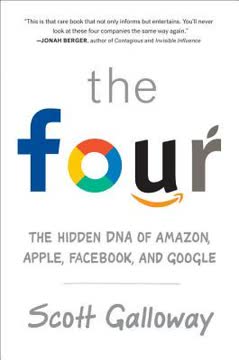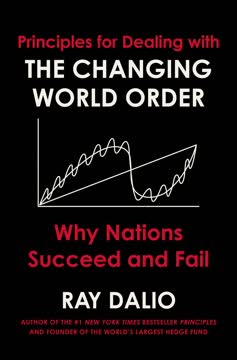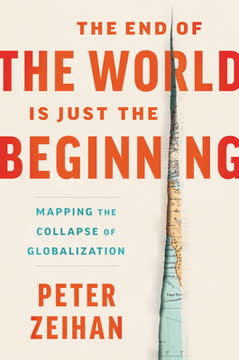Key Takeaways
1. Reflexivity: The Two-Way Connection Between Thinking and Reality
There is a two-way connection between thinking and reality which, when it operates simultaneously, introduces an element of uncertainty into the participants' thinking and an element of indeterminacy into the course of events.
Reflexivity explained. Reflexivity is a core concept in Soros's theory, asserting that there is a circular relationship between people's thoughts and the real world. This relationship creates a feedback loop where perceptions influence reality, and reality, in turn, shapes perceptions. In financial markets, this manifests as investors' beliefs affecting market prices, which then impact the underlying economic fundamentals.
Impact on financial markets. This concept challenges the prevailing economic theory that markets tend towards equilibrium. Instead, Soros argues that markets can be inherently unstable due to this reflexive relationship. This instability can lead to boom-bust cycles, bubbles, and crashes that are not adequately explained by traditional economic models.
Broader implications. Reflexivity extends beyond finance to all areas of human affairs, including politics and social phenomena. It suggests that our understanding of the world is inherently imperfect and that this imperfection can have significant real-world consequences.
2. The Super-Bubble: A Culmination of Credit Expansion and Market Fundamentalism
Superimposed on the U.S. housing bubble there is a much larger boom-bust sequence which has finally reached its inflection, or crossover, point.
The concept of super-bubble. Soros identifies a long-term super-bubble that has been developing since the 1980s, characterized by:
- Increasing credit expansion
- Globalization of financial markets
- Progressive deregulation and financial innovations
Market fundamentalism. This super-bubble is underpinned by a prevailing misconception Soros calls "market fundamentalism" – the belief that markets are self-correcting and should be given free rein. This ideology, popularized during the Reagan-Thatcher era, led to excessive deregulation and risk-taking in the financial sector.
Consequences and outlook. The bursting of this super-bubble, triggered by the 2008 financial crisis, marks the end of an era of credit expansion based on the dollar as the international reserve currency. Soros predicts far-reaching consequences for the global economy and financial system, including a potential shift in global economic power.
3. The Housing Bubble: A Catalyst for Financial Crisis
Housing prices will have to fall at least 20 percent over the next five years to get back to a normal relationship to household income.
The formation of the bubble. The U.S. housing bubble was fueled by:
- Low interest rates following the 2001 recession
- Increasingly lax lending standards
- Complex financial instruments like CDOs and CDSs
- Misconception that housing prices would continually rise
The bursting of the bubble. As housing prices began to fall, it triggered a chain reaction:
- Subprime mortgage defaults increased
- Value of mortgage-backed securities plummeted
- Banks and financial institutions faced liquidity crises
- Credit markets froze, affecting the broader economy
Wider implications. The housing crisis exposed deeper issues in the financial system, including excessive leverage, inadequate risk management, and regulatory failures. It served as the catalyst for the broader financial crisis and the unraveling of the super-bubble.
4. The Fallibility of Economic Theory and Market Equilibrium
The belief that markets tend towards equilibrium is directly responsible for the current turmoil; it encouraged the regulators to abandon their responsibility and rely on the market mechanism to correct its own excesses.
Critique of equilibrium theory. Soros challenges the fundamental assumptions of mainstream economic theory, particularly the notion that markets tend towards equilibrium. He argues that this belief is not only incorrect but also dangerous, as it led to inadequate regulation and risk management.
The human uncertainty principle. Drawing parallels with Heisenberg's uncertainty principle in physics, Soros introduces the concept of human uncertainty in social sciences. This principle suggests that our attempts to understand and predict social phenomena inherently affect those phenomena, making precise prediction impossible.
A new paradigm. Soros proposes a new framework for understanding financial markets:
- Markets are always biased rather than tending towards equilibrium
- Participants' imperfect understanding drives market movements
- Reflexivity can lead to self-reinforcing trends and bubbles
5. China and India: Emerging Economic Powerhouses Amid Global Uncertainty
China will sail through the current financial crisis and subsequent recession with flying colors and gain considerable relative strength.
China's economic transformation. Soros observes China's rapid economic growth and structural changes:
- State-owned enterprises transitioning to private ownership
- Negative real interest rates fueling an asset bubble
- Strong domestic demand potentially offsetting export slowdown
India's economic rise. India is also highlighted as a significant emerging economy:
- Doubling of growth rate due to economic reforms
- Boom in information technology and outsourcing sectors
- Increasing infrastructure investment
Global economic shift. The resilience of these emerging economies, coupled with the struggles of developed nations, suggests a potential rebalancing of global economic power. This shift could have profound implications for international relations and the world order.
6. The Decline of U.S. Power and the Shift in Global Economic Balance
The United States during the Bush administration failed to exercise proper political leadership. As a result the United States has suffered a precipitous decline in its power and influence in the world.
Factors contributing to decline. Soros identifies several factors weakening the U.S. position:
- Misguided foreign policy, particularly the Iraq War
- Growing budget and current account deficits
- Loss of confidence in the dollar as the global reserve currency
Rise of alternative powers. As U.S. influence wanes, other nations are gaining prominence:
- China and India's economic ascendance
- Growing influence of oil-producing countries
- Emergence of sovereign wealth funds as major financial players
Implications for global order. This shift in economic power is likely to have far-reaching consequences:
- Potential for a multi-polar world order
- Challenges to dollar hegemony in international finance
- Need for new forms of global economic cooperation and governance
7. Policy Recommendations: Regulating Credit Creation and Controlling Leverage
Clearly an unleashed and unhinged financial industry is wreaking havoc with the economy. It needs to be reined in.
Rethinking regulation. Soros advocates for a more balanced approach to financial regulation:
- Recognizing that markets are not self-regulating
- Implementing stricter controls on leverage and credit creation
- Requiring greater transparency from all market participants, including hedge funds and sovereign wealth funds
Monetary policy reform. He suggests that central banks need to:
- Focus on both money supply and credit conditions
- Consider asset price inflation, not just consumer price inflation
- Actively manage market expectations
Specific measures. Some concrete recommendations include:
- Establishing clearing houses for complex financial instruments like credit default swaps
- Holding regulators accountable for allowing systemic risks to build up
- Balancing the need for financial innovation with systemic stability
Soros emphasizes that these reforms should aim to preserve the benefits of market flexibility while preventing the build-up of dangerous excesses that can lead to financial crises.
Last updated:
FAQ
What's "The New Paradigm for Financial Markets" about?
- Author's Perspective: The book, written by George Soros, explores the financial crisis of 2008 and introduces a new paradigm for understanding financial markets.
- Core Concept: Soros challenges the prevailing belief that markets tend toward equilibrium, proposing instead that they are influenced by reflexivity, where market participants' perceptions affect market realities.
- Historical Context: The book provides a historical analysis of financial markets, focusing on the super-bubble that led to the 2008 crisis.
- Philosophical Insights: Soros integrates his philosophical views, particularly the theory of reflexivity, to explain the dynamics of financial markets.
Why should I read "The New Paradigm for Financial Markets"?
- Understanding Crises: It offers a comprehensive analysis of the 2008 financial crisis, providing insights into its causes and implications.
- New Theoretical Framework: Soros introduces the theory of reflexivity, which challenges traditional economic theories and offers a new way to understand market behavior.
- Practical Insights: The book provides practical recommendations for policymakers and investors on how to navigate financial markets.
- Author's Expertise: As a successful investor and philanthropist, Soros brings a unique perspective that combines practical experience with theoretical insights.
What are the key takeaways of "The New Paradigm for Financial Markets"?
- Reflexivity Theory: Markets are influenced by participants' perceptions, which can lead to self-reinforcing cycles of boom and bust.
- Super-Bubble Concept: The 2008 crisis was the culmination of a long-term super-bubble driven by excessive credit expansion and market fundamentalism.
- Regulatory Recommendations: Soros advocates for better regulation of financial markets to prevent future crises, emphasizing the need for oversight of credit creation.
- Philosophical Underpinnings: The book highlights the importance of acknowledging human fallibility and the limitations of knowledge in economic decision-making.
What is the theory of reflexivity as explained by George Soros?
- Two-Way Interaction: Reflexivity describes a feedback loop where market participants' perceptions influence market realities, which in turn affect perceptions.
- Cognitive and Manipulative Functions: Participants' understanding (cognitive function) and their actions to change the situation (manipulative function) can interfere with each other.
- Market Implications: This theory suggests that markets do not naturally tend toward equilibrium but can be driven by self-reinforcing cycles.
- Historical Significance: Reflexivity can lead to significant historical events, such as financial bubbles and crises, by distorting market fundamentals.
How does George Soros describe the 2008 financial crisis in "The New Paradigm for Financial Markets"?
- Culmination of a Super-Bubble: Soros argues that the crisis was the result of a long-term super-bubble fueled by credit expansion and market fundamentalism.
- Housing Bubble: The immediate trigger was the U.S. housing bubble, characterized by aggressive lending practices and securitization of mortgages.
- Systemic Failures: The crisis exposed systemic failures in financial regulation and the flawed assumption that markets are self-correcting.
- Global Impact: The crisis had far-reaching consequences, affecting global financial stability and leading to a reevaluation of economic policies.
What are George Soros's policy recommendations in "The New Paradigm for Financial Markets"?
- Regulation of Credit Creation: Soros emphasizes the need for better regulation of credit creation to prevent excessive leverage and asset bubbles.
- Addressing Moral Hazard: He suggests that financial institutions should pay a price for the protection they receive from authorities to mitigate moral hazard.
- Systemic Risk Management: Regulators should have a better understanding of financial innovations and manage systemic risks effectively.
- Housing Market Intervention: Soros advocates for government intervention to stabilize the housing market and prevent further declines in house prices.
What is the super-bubble hypothesis in "The New Paradigm for Financial Markets"?
- Long-Term Credit Expansion: The super-bubble refers to a long-term trend of credit expansion that began in the post-World War II era.
- Market Fundamentalism: It was driven by the belief in the self-correcting nature of markets, leading to deregulation and financial innovation.
- Culmination in 2008 Crisis: The super-bubble reached its peak with the 2008 financial crisis, exposing the flaws in the prevailing economic paradigm.
- Need for New Paradigm: Soros argues that the super-bubble's collapse necessitates a new understanding of financial markets based on reflexivity.
How does George Soros's personal experience influence "The New Paradigm for Financial Markets"?
- Successful Speculator: Soros draws on his experience as a successful hedge fund manager to illustrate the practical application of his theories.
- Historical Perspective: His career spans several financial crises, providing a unique historical perspective on market dynamics.
- Philosophical Insights: Soros's philosophical explorations, particularly the theory of reflexivity, are informed by his personal experiences in the markets.
- Real-Time Experiment: The book includes a real-time experiment where Soros documents his investment decisions, demonstrating the application of his theories.
What are the best quotes from "The New Paradigm for Financial Markets" and what do they mean?
- "Markets are always wrong." This quote encapsulates Soros's belief that markets operate with a prevailing bias and are influenced by participants' misconceptions.
- "The ultimate truth is beyond our reach." Reflects Soros's philosophical stance on human fallibility and the limitations of knowledge in understanding complex systems.
- "We are in a period of great uncertainty." Highlights the transitional nature of the current financial era and the need for a new paradigm to navigate it.
- "The financial industry was allowed to get far too profitable and far too big." Critiques the deregulation and excessive growth of the financial sector leading up to the crisis.
How does "The New Paradigm for Financial Markets" challenge traditional economic theories?
- Equilibrium Theory Critique: Soros challenges the notion that markets naturally tend toward equilibrium, arguing instead for the role of reflexivity.
- Rational Expectations Theory: He disputes the idea that market participants act on perfect knowledge, emphasizing the role of biases and misconceptions.
- Scientific Method Limitations: Soros argues that social sciences, including economics, cannot be studied with the same methods as natural sciences due to human fallibility.
- Need for New Paradigm: The book calls for a shift away from market fundamentalism toward a more nuanced understanding of market dynamics.
What is the significance of the housing bubble in "The New Paradigm for Financial Markets"?
- Trigger for Crisis: The U.S. housing bubble was the immediate trigger for the 2008 financial crisis, highlighting the dangers of excessive credit expansion.
- Misconceptions in Lending: The bubble was fueled by misconceptions about the stability of housing prices and aggressive lending practices.
- Systemic Impact: The collapse of the housing market had widespread implications, affecting financial institutions globally and leading to a reevaluation of regulatory policies.
- Lesson for Future: Soros uses the housing bubble as a case study to illustrate the need for better regulation and understanding of market dynamics.
How does George Soros propose to reconcile the new paradigm with the old one in "The New Paradigm for Financial Markets"?
- Acknowledging Reflexivity: Soros suggests integrating the concept of reflexivity into economic theories to better account for market dynamics.
- Regulatory Reforms: He advocates for regulatory reforms that address the limitations of the old paradigm, particularly in managing credit and leverage.
- Balancing Flexibility and Stability: Soros emphasizes the need to balance market flexibility with economic stability, recognizing the role of human fallibility.
- Ongoing Debate: The book calls for a lively debate on how to reconcile the new paradigm with existing economic theories and address global challenges.
Review Summary
The New Paradigm for Financial Markets presents Soros's theory of reflexivity and its application to the 2008 financial crisis. Readers found the book's philosophical approach intriguing but sometimes overly complex. Many appreciated Soros's insights into market dynamics and predictions, while others felt the theory lacked practical applicability. The book's analysis of the crisis and its causes was generally well-received. Some readers struggled with the dense writing style and repetitive explanations, but others valued Soros's unique perspective on economics and finance.
Similar Books










Download PDF
Download EPUB
.epub digital book format is ideal for reading ebooks on phones, tablets, and e-readers.








